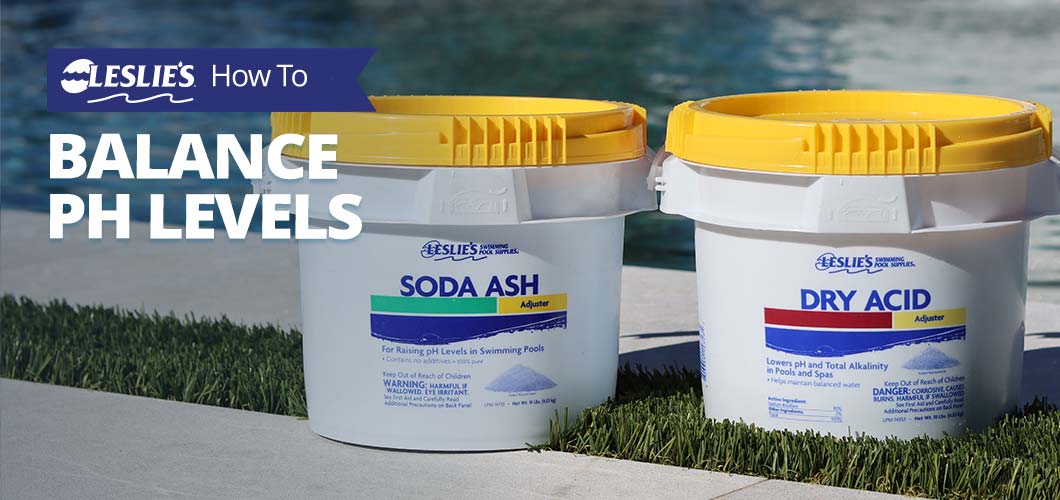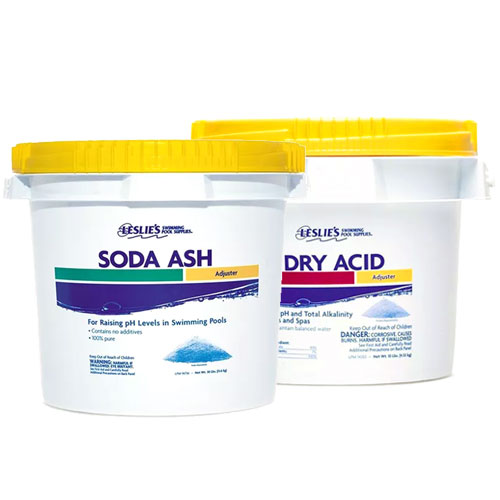
How to Balance pH Levels in a Pool
When it comes to enjoying your pool or hot tub, one water balance element is arguably more important than all others: pH. All aspects of water balance can impact other areas of water chemistry. However, imbalanced pH can pose a myriad of issues both to you and your pool. For example, it can impact chlorine effectiveness, cause uncomfortable swimming conditions, and even facilitate scaling and corrosion of pool and equipment surfaces. Here's what you need to know about balancing the pH levels in your pool.
What is Pool pH?
pH is essentially a measure of how acidic or basic a solution is. The pH scale goes from 0 to 14, with 7.0 being the neutral point. Anything below 7.0 is considered acidic, and everything above 7.0 is considered basic.

In most cases, the ideal pH for a pool is 7.4–7.6. But anything within the range of 7.2–7.8 is totally acceptable.
Every solution has a pH. Coffee has a pH of 5. Most hand soaps have a pH of 9–10. The fluid in your eye has a pH of 7.4. Lemon juice, on the other hand, has a pH of 2.4, which is very acidic. If you've ever squirted lemon juice in your eye, you know it burns. This is because the pH of lemon juice is well below 7.0, which makes it very acidic. The same principle applies to your pool water. When your eyes sometimes burn during or after swimming in your pool, there's a good chance that the pH level in your pool is below the recommended range.
Why is pH Important for Pool Water?

The lower your pH levels fall on the scale, the more acidic the water becomes. A low pH can cause a whole slew of issues in a swimming pool. These range from skin and eye irritation, to corrosion of pool surfaces and equipment. In addition, low pH levels are notorious for irreparably damaging vinyl pool liners, solar covers, and inflatable pool accessories like floats and loungers.
It's worth noting here that chlorine works more effectively when pH is toward the lower end of the recommended range. However, chronic issues with low pH can lead to a higher chlorine bill, as this also causes chlorine levels to dissipate more quickly. It's also not worth the risk of pool damage if you let the levels fall too low. Corrosion and oxidation of metals, etching and erosion of plaster and grout surfaces, and plastic and vinyl becoming brittle are just a few of the more costly problems you'll encounter over time if the issue is not corrected.
On the other hand, the higher the pH in your pool, the more basic or alkaline the water. High pH leads to reduced chlorine efficacy, may cause cloudy water issues, and accelerates the formation of stains and scaling on pool surfaces. Along with these issues, your pool is at an increased risk of an algae bloom thanks to the decrease in chlorine performance and water conditions that are more hospitable to algae growth.
Long story short, this is one area of water balance where either a high or low test result can lead to costly pool damages, unsanitary water, and a generally uncomfortable swimming experience. Certain pool chemicals, the presence of algae, using water features and aerators, a Total Alkalinity imbalance, or even a recent plaster resurfacing project can all drive the pH higher. Stabilized chlorine, acidic rainfall, and excessive leaves/mulch/organic debris in the water can all bring the pH down. To correct these issues, you'll need to balance the pool water.
How to Balance pH in a Pool
As mentioned above, the ideal range for pH in pool water is 7.4–7.6, but pH levels between 7.2–7.8 are still acceptable in most scenarios. Before you get started adjusting pH levels, it's important to balance the pool's Total Alkalinity first. Total Alkalinity (TA) acts as a buffer to stabilize pH levels, and many of the same chemicals used to balance TA will also raise or lower pH. Balance one, and then the other, but don't try to balance both at the same time. Once you've confirmed that the TA levels are in balance, you're ready to adjust your pool's pH. Turn on the pool pump, and leave your circulation system running on high while rebalancing the pool water.
To balance pH in your pool, you will need:
- Leslie's Soda Ash to increase levels
- Leslie’s Dry Acid or Muriatic Acid to decrease levels
- Water testing kit to check water balance
- Safety goggles
- Acid-resistant gloves
BONUS TIP: If you're attempting to adjust pH, you will also be adjusting Total Alkalinity at the same time. Always retest both after adding pH or Total Alkalinity adjustment chemicals. If levels are way off, you may need to go back and forth, making minor adjustments until both levels are within range. Allow the chemicals plenty of time to distribute throughout the pool, then retest the water before adding additional chemicals. Never mix chemicals!
How to increase low pH

If you test your pool water and find the pH is too low, you can bring it up with Leslie's Soda Ash (sodium carbonate). Always follow product label instructions carefully for correct dosing and application information. In most cases, when the pH is below 7.2, you'll want to add Soda Ash at a rate of 1 pound per 10,000 gallons. Do not add more than 4 pounds of Soda Ash to the pool at a time. Retest the water after 4 hours, and make additional adjustments as needed.
How to decrease high pH

For high pH levels, you have a couple different options for bringing it back into the ideal range. Leslie’s Dry Acid (sodium bisulfate) is the most common product used for pH and Total Alkalinity adjustments, as it's compatible with nearly all pool types.
Muriatic Acid is another chemical that can lower pH. However, it requires more preparation and caution, because Muriatic Acid needs to be diluted with water before being used in your pool. It is not recommended for use on fiberglass, vinyl liner, painted, or tile pools — use Dry Acid instead.
Again, always read and follow the product label for dosing and application instructions, no matter which chemical you use.
How to Dilute Muriatic Acid:
- Always follow label instructions for safe handling and application. This often includes wearing Personal Protective Equipment (PPE).
- Fill a clean bucket with 3–4 gallons of water.
- Slowly add the Muriatic Acid to the bucket. The amount depends on the volume of your pool and the required adjustment. Never add more than 16 oz per 10,000 gallons at one time.
- Carefully mix the water and acid solution with a plastic or wooden utensil.
- With the pump running, pour the solution into the deep end of your pool, or away from the skimmer or any fixtures.
BONUS TIP: Have an above ground spa or hot tub? Don't use Soda Ash or Muriatic Acid. Instead, use Leslie's Spa pH Up to increase pH levels or Leslie's Dry Acid to decrease pH levels. As always, carefully read and follow product instructions to determine proper dosing and application. Hot tubs are much different than pools!
That's all there is to it! We hope that this article has been helpful, and that you now have a better understanding of the importance of maintaining proper pH balance in your swimming pool. However, if you ever need help or guidance, your local Leslie's is here to help. Call or stop by today to speak with one of our knowledgeable pool experts for water balancing tips and helpful advice. Don't forget to bring a water sample with you for a free in-store AccuBlue® water test and customized, easy-to-follow water treatment plan. Not only will we help you precisely pinpoint what's going on with your water, we'll walk you through step-by-step, including the product recommendations and dosages needed to keep your pool on track. While you're at it, be sure to check out our entire water balance series in our resource center!